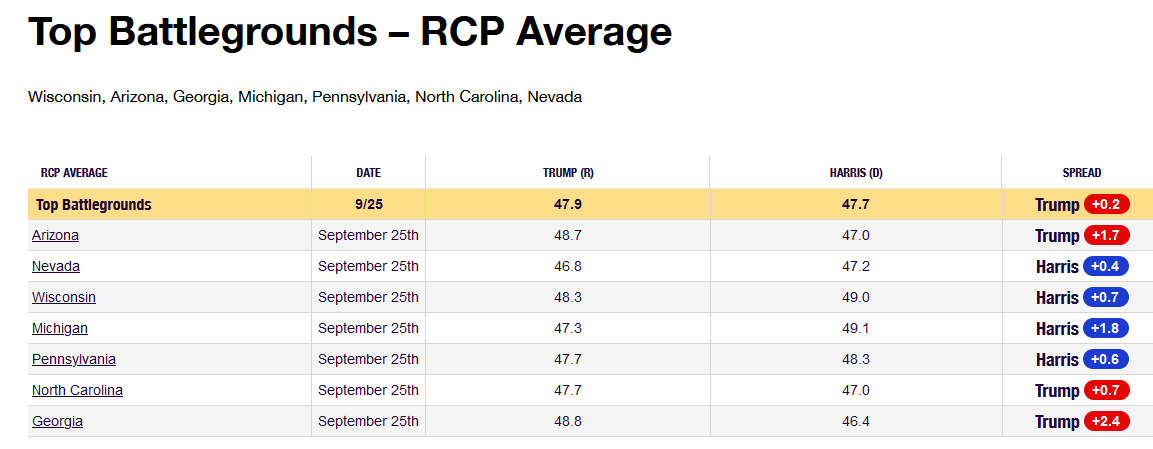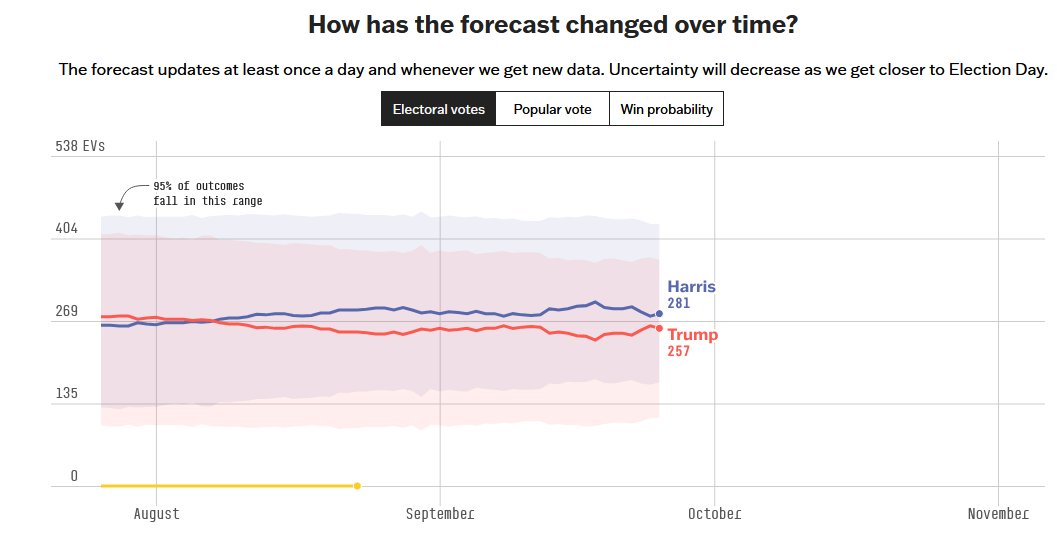What we learned from the polls so far
Why they don't matter much
Polling for the U.S. Presidential Race is in high gear today, and the race looks close. It didn’t always. In the summer, before Joe Biden packed it in, Americans on both sides of the aisle preferred Trump who had a commanding 3 to 5 percentage point lead in the polls back in July. Biden dropped out and Harris took over without winning a single primary vote anywhere.
As at September 25 in the 2016 election, Hilary Clinton had a 3.1 percentage point lead and lost badly. That should persuade readers that the polls are poor predictors of outcomes. But first derivatives of polls are useful and display a trend that points (at the margin) to voters shifting allegiances.
During September, after Trump’s relatively poor showing at the debate with Harris, Harris has held on to an average 2.1 percentage point lead but the September 22 CNN poll shows her with a mere 1% lead and the Quinnipac poll on the same date called it a tie. The CNN poll is interesting since CNN suffers among the worse cases of Trump Derangement Syndrome anywhere, the the CBC, NBC and Morning Consult polls likely suffer a bit of leftist bias. It is easy to influence poll results without cheating on questions and answers, just poll people in counties where the historical preponderance of a particular party points to a bias, conduct the poll professionally, and tout the results as if they could be generalized.
Most of the state polls are meaningless anyway, since only a few states actually have close enough races to matter and the majority of states will display outcomes consistent with their ideological biases - California Democrat and Texas Republican, for example - almost independent on what the polls say.
The so-called “battleground” states are another matter since the race in those states is close enough that they can determine the election. In those states as a group, Trump has a minor edge. If Trump can hang on to Arizona, Georgia and North Carolina and win in Pennsylvania, he will be President next January. If Harris can hold Nevada, Wisconsin, Michigan and Pennsylvania, she is a likely winner.
538 Presidential Polls handicaps the outcome calling a 56% chance of a Harris win. The modelling is interesting but in my opinion the trend is more valuable in terms of predictive validity - and the trend favors Trump. Harris odds of winning are falling in the past two weeks and Trumps rising.
The same modelling shows Harris with 281 electoral college votes and Trump with 267, a clear win for Harris. But if Trump wins Pennsylvania, it becomes 277 Trump and 261 Harris.
A recent Monmouth poll in Pennsylvania found the issues most important to voters were the economy and inflation. Trump is favored on those issues, while Harris is favored on abortion rights (oddly, an issue neither she nor Trump can influence since it is Constitutionally a matter for the states, not the federal government). Immigration is also a concern and Trump leads there as well.
Ultimately, the Pennsylvania outcome will depend on voter turnout more than any other factor, and it could go either way. I will keep reviewing the data over the remaining 41 days until November 5th, but if I had to call it today I would bet on a Trump win in Pennsylvania if for no other reason than Harris flip-flops on “fracking” which employs hundred of thousands of people in the State. If I were voting, I wouldn’t trust her quite recent claim that she would not ban “fracking” since she has been adamant she would for years, and suspect her about face is parsing words like “ban” rather than “curb” or “stifle” since an outright ban is unnecessary to satisfy the leftist ideology that supports her if pretending she favors the technology gets her elected, and in my opinion there is a zero chance she will leave “fracking” alone if elected.







Just go vote. Corrupt media wants to influence events, not report on them.